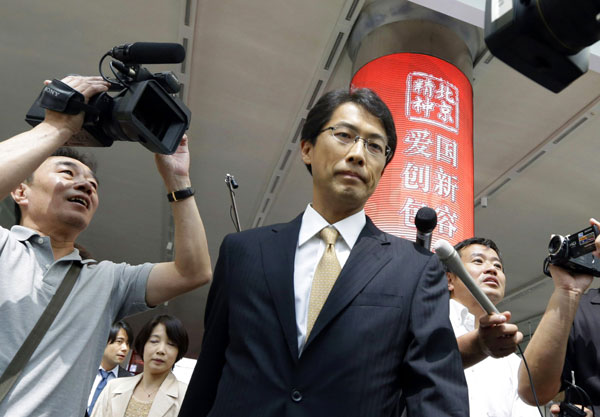Japan, DPRK talk in Beijing
 0 Comment(s)
0 Comment(s) Print
Print E-mail China Daily, August 30, 2012
E-mail China Daily, August 30, 2012
The first Tokyo-Pyongyang meeting for four years will not bring substantial changes to the strained bilateral ties, analysts said, as representatives from the two countries held talks in Beijing on Wednesday.
The meeting will have a positive influence on relations between Japan and the Democratic People's Republic of Korea, but bilateral ties will not see substantial improvement, said Wang Junsheng, an expert on East Asian studies with the Chinese Academy of Social Sciences.
|
|
|
Japanese Foreign Ministry Northeast Asia Division Director Keiichi Ono arrives at the airport ahead of talks with the Democratic People's Republic of Korea in Beijing on Wednesday. Japan and the DPRK are holding their first government-to-government talks in four years amid hopes for a fresh approach on foreign relations from new DPRK leader Kim Jong-un. [Photo: Agencies via China Daily] |
Japan is an important ally of the United States in East Asia, which means they have imposed a number of sanctions against the DPRK due to Pyongyang's nuclear program, so Tokyo is feeling pressure from Washington whenever it attempts to improve ties with Pyongyang, he added.
The meeting shows that both the DPRK and Japan have the will to improve ties, but Pyongyang's nuclear program and policy of "military as priority" will not be changed, said Zhang Liangui, a professor on Korean Peninsula studies at the Party School of the Communist Party of China Central Committee.
The meeting was held at 3 pm in the Japanese embassy in Beijing, and there may be another session at the DPRK embassy on Thursday, if the discussion cannot be concluded on Wednesday.
The Tokyo-Pyongyang dialogue marks the first government-to-government meeting between the two countries since 2008, and the first since DPRK leader Kim Jong-un took power from his father, who died in December.
Expectations are high that Kim will adopt a less confrontational approach to manage relations with the outside world, according to The Associated Press.
Analysts said both the DPRK and Japan have reasons to meet other than simply improving bilateral ties.
By improving ties with Japan, Pyongyang is attempting to lessen its isolation from the international community and get more economic assistance from Japan, Zhang said.
The DPRK is plagued by natural disasters such as floods and typhoons, and is struggling to feed its people.
Jin Matsubara, Japan's state minister on the abduction issue, told media on Aug 24 that progress could yield big dividends in humanitarian aid.
The meeting also comes as Japan is drawn into bitter maritime territorial disputes with its neighbors including its main ally - the Republic of Korea.
With improved ties with the DPRK, Japan aims at breaking the diplomatic deadlock, said Wang, adding Pyongyang may take advantage of the friction among the Asian allies.
During the meeting, Japan will focus on the return of the remains of Japanese nationals who died in the DPRK during World War II, according to Japanese media, while the abduction issue will also on Japan's agenda.
Pyongyang admitted in 2002 it kidnapped 13 Japanese in the 1970s and 1980s to help train its spies. It allowed five of them and their family members to return, while claiming the rest died.
But many Japanese believe some of the kidnap victims are still alive.







Go to Forum >>0 Comment(s)